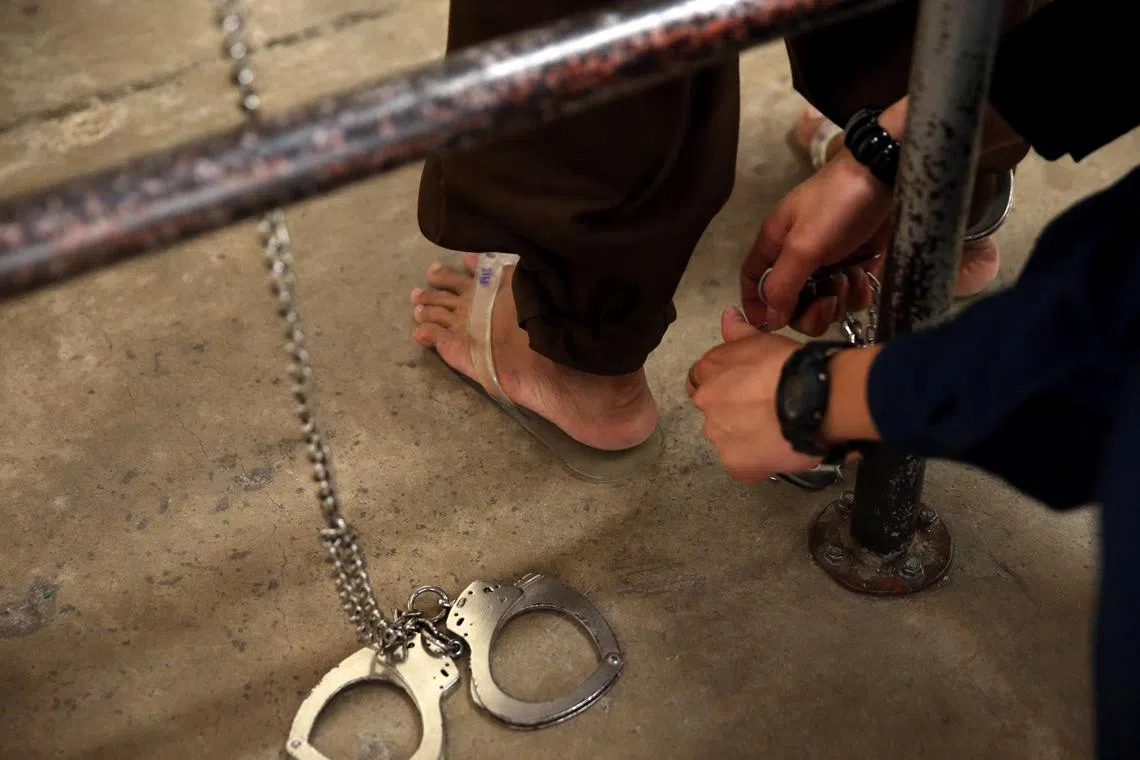Four in 10 former inmates released from prison in 2017 reoffended
Sign up now: Get ST's newsletters delivered to your inbox

The recidivism rate for inmates from the 2017 cohort was 39.9 per cent.
PHOTO: ST FILE
SINGAPORE - About four in 10 former convicts released from prison in 2017 ended up reoffending and were detained, sentenced to jail, or given a day reporting order within five years of their release.
Many were drug offenders.
Annual statistics released by the Singapore Prison Service (SPS) on Thursday showed that the five-year recidivism rate for inmates released in 2017 from the Drug Rehabilitation Centre (DRC) was 45.2 per cent, while the two-year recividism rate was 26.1 per cent for those released in 2020.
Deputy Superintendent (DSP) of Prisons Ravin Singh said drug offenders face greater struggles in keeping clean for a longer time.
“Drug offenders face bigger struggles in their desistance journey, as drug addiction is a habit which is difficult to break, but not impossible.
“Therefore, SPS, together with our colleagues from Yellow Ribbon Singapore and other Home Team departments, as well as our community partners and volunteers, will work more closely to help drug offenders remain drug-free even beyond the two-year or five-year mark,” said DSP Singh.
Current support programmes include counselling, befriending services and employment assistance.
The five-year recidivism rate, which SPS released for the first time, also showed that 39.9 per cent of all former inmates were detained or given a day reporting order within five years of their release.
Speaking to the media at a briefing on Thursday, DSP Singh, who is the assistant director at SPS’ corporate communications and relations division, said SPS will also be connecting former offenders with a network of former prisoners who have remained crime-free
The Desistor Network, which will be set up in the second quarter of 2023, will provide avenues for former offenders to connect through events and interest groups.
SPS has also doubled its training spaces for new volunteers who work with inmates and supervisees, from 700 in 2021 to 1,400 in 2022.
Training includes developing befriending skills and knowledge on correction.
SPS said the two-year recidivism rate for the 2020 cohort was 20.4 per cent, a slight increase from the 20.0 per cent from the 2019 cohort, which was the lowest in 30 years.
It added that the rate is among the lowest globally.
Figures over the last three years also showed more people were jailed over traffic offences – 984 in 2022, compared with 819 in 2021, and 734 in 2020.
Offences ranged from drink driving to a failure to pay composition fines.
Referring to the five-year recidivism rate, Mr Ravan Kumar, who is with Industrial and Services Cooperative Society, a non-profit group that supports former offenders, said drug users can struggle to stay clean over a longer period.
SPS figures showed that the total inmate population in the DRC in 2022 was 3,337, compared with 3,120 in 2021 and 2,984 in 2020.
Mr Ravan, who is assistant manager of support and guidance at the group, said he previously worked with a man who succumbed to temptation after staying drug-free for eight years. The man returned to DRC in 2016.
He added that the man, who is now in his 60s, has been out of prison for about five years in total.
“He said it was a challenge every day. The triggers to drug offending can be anywhere – it’s a daily struggle,” said Mr Ravan.
Former inmate James (not his real name) said job security helped keep him out of trouble.
The 38-year-old, who currently works for a sushi restaurant, said he returned to prison in 2021 after he fell back into the drug habit following a previous stint behind bars in 2019.
“When you are not working, you tend to think about doing all the bad things and that is when you relapse,” he said.
After his release in 2022, James started working as a part-timer at the restaurant before making it as a management trainee.
“We are always on a recovering mode, we are never recovered. So fighting triggers is ongoing until the day you rest in peace,” he said.
Figures released on Thursday also showed that there were 979 inmates under 30 in 2022.
To help reduce the chances of young offenders being negatively influenced, SPS’ director of rehabilitation and reintegration division, Assistant commissioner Caroline Lim, said they are not housed in the same cells with older offenders.
The young inmates are encouraged to study and take their exams in prisons, and she said there is also skills training for them to explore.



